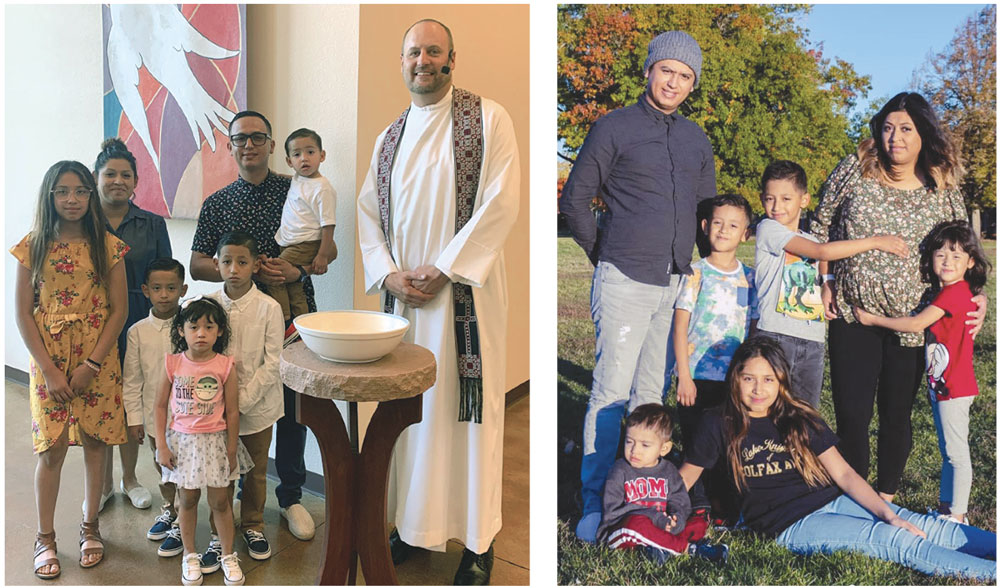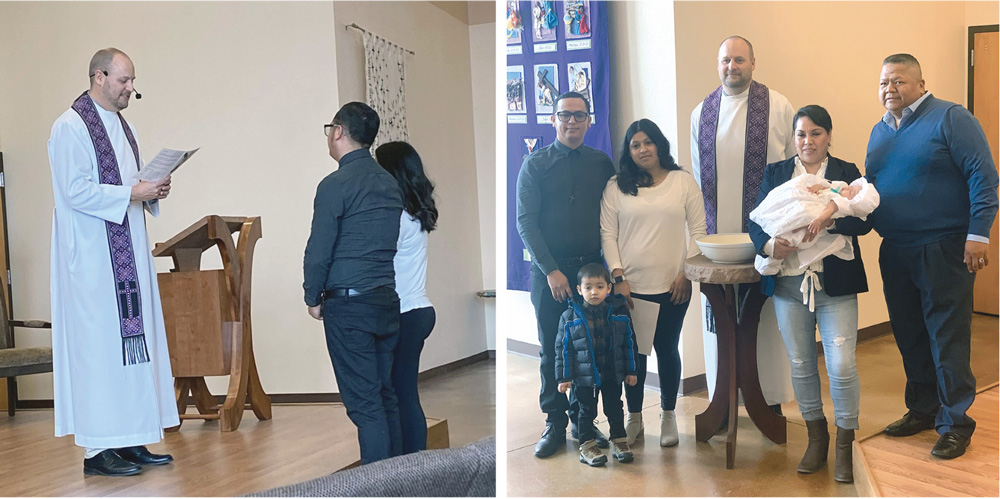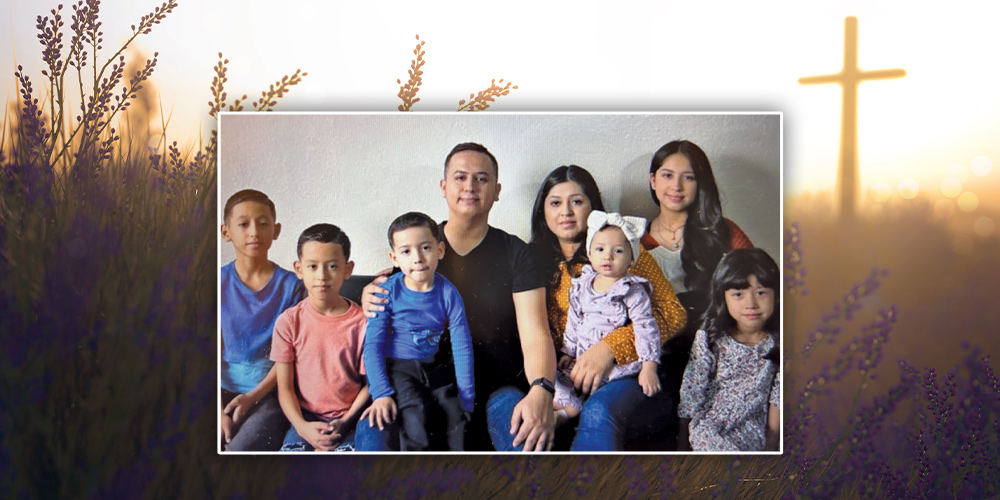 |
A truth seeker finds solace and hope in the Word of God preached online and then walks into a church with the same beliefs.
As a child, Salvador Contreras sat amid the other little ones in a dusty setting.
They listened to the words of an Asian woman. She was telling them about her hard times. She shared how she had once lived on the street, addicted to drugs. Then the woman told the children that God had rescued her from her past. He had given her hope and comfort in his Word.
Now, compelled to share her story and the good news with others, the woman taught Bible classes to children. She told them how much God loved them. She spoke of how he had helped her through her problems. He would do the same for the kids listening to her.
Those words never left Salvador’s mind. Already at the age of eight, he knew firsthand how tough life could be. He grew up in Juarez, Mexico, a rough-and-tumble border town. Life was far from easy. Salvador’s family had seen hard times.
Every day when they walked to the store, they passed homeless people, heroin vendors, and beggars. The children sitting next to Salvador listening to the Asian woman understood what it meant not knowing from where the next meal would come.
“I remember being so surprised that she took the time for us,” Salvador recalls. “She had learned to speak Spanish and liked to read the Bible to small children. I could tell God changed her life, and it left an impact on me that I carry to this day.”
Searching for the truth
Salvador’s parents were nominally Catholic. “Once in a while, we would go to church,” he says.
Then a non-profit showed up in their community. It offered to help build homes for those in need. The organization also provided some Bible studies for those in the neighborhood. A pastor came around to see if anyone needed help. It was this encounter that opened Salvador’s eyes to what church could be like.
He found himself attending the studies. The Asian woman who taught the children was connected to the nonprofit. These early experiences solidified in Salvador a desire to learn about God and be close to him.
The organization didn’t stay in the area. When the group left, Salvador didn’t know of another church to attend. He spent some time away from organized services.
“I never saw anything as bad as the Asian woman related, but I did go through my share of hard times,” Salvador says.
As a young adult, he met and married Natalia. They had their first child, a daughter. Getting and keeping a job was far from easy. Salvador eventually found work in a factory. After his shift, he would return home around midnight. “During those times, I remembered the Asian woman’s words and how God could help in any situation.”
Salvador was certain of one thing: He didn’t want his daughter to end up on the street. So many challenges confronted young people in the crowded barrios of a northern Mexican town that he dreaded to think what could happen.
He turned on the television and looked for any gospel-like message he could find.

Digging into God’s Word
As a working adult with a family, Salvador wanted a church home where his family could belong. He came across a Pentecostal church nearby. The family started attending. “It was very charismatic,” he remembers. The emphasis on following rules struck him. “I really wanted to learn more and study God’s Word,” he says.
When Salvador’s sister invited him and his family to live with her in Piedras Negras, he agreed.
Piedras Negras also is located along the border but has a different atmosphere than Juarez. The population of Juarez stood at more than 1 million. Fewer than 200,000 people lived in Piedras Negras.
In Piedras Negras, Salvador connected with a pastor who taught him Greek and some other courses. “I increasingly felt it was important to learn about God. I wanted to be able to raise my family in the Word,” he says. “Having a Christian home would benefit them in life.”
After a turn of events, Salvador and his family had to leave Mexico. They gained political asylum in the United States. His search for a job led him to the Denver area. The family lived in a suburb and attended a local Pentecostal church. “While there, I started to get a whiff of God’s Word,” Salvador says. “I wanted a place to attend that focused more on the Bible.”

Studying with Academia Cristo
Salvador searched online for more information about the gospel. He came across a YouTube channel featuring a pastor preaching in Spanish. The pastor referenced Academia Cristo as a way to learn more about the truth and have peace (see more below in “Academia Cristo in the United States”). He said it offered courses for anyone interested in the Bible.
Salvador found the Academia Cristo app, downloaded it, and started taking self-study courses. Once he got to a certain point in the courses, he started studying with professors in real-time on the app. “During that time, I heard a phrase I’ll never forget,” Salvador shares. “A teacher mentioned that there has to be a balance between the preaching of sin and God’s love.”
Throughout his past experiences with other churches and leaders, Salvador had seen an imbalance of these teachings. “Some places preached only the rules; others decided never to mention sin and focus only on how much God cares for you. We need to hear both,” he says.
While studying with the Academia Cristo app, Salvador looked online for a Lutheran church. He found Christ Lutheran Church, a WELS mission in Denver, and attended a service on a Sunday with his family. “I had a lot of questions and investigated the place. I wanted to be sure it taught what I had been learning through Academia Cristo.”
Salvador discovered that the pastor at the church had spent years studying for the ministry. “He drew from a strong base, which I felt was important. I’ve seen others decide one day to be a pastor and declare themselves to be ‘ministers’ the following day.”
Salvador and his wife, Natalia, now have six children. Their three girls and three boys have all been baptized, and Salvador and Natalia became members of Christ in March 2022. “I want to raise them to hold to the truth of God’s Word for their whole lives,” says Salvador. “It really does change you and will get you through whatever difficulties you face.”
Academia Cristo in the United States
Originally developed by the WELS Latin America mission team, the Academia Cristo program has reached Spanish speakers around the globe. Its app is free to download and offers courses that range from beginner to advanced. Since its unveiling in 2021, the Academia Cristo app has been downloaded more than 800,000 times. With a tagline of Aqui tu paz (Your Peace, Here), the tool provides resources related to study, worship, and congregating.
The program entails the following:
• Students can take self-study courses and then advance to live online classes.
• The program offers a path to doctrinal agreement with WELS and opportunities for service.
• Those interested in leadership can enroll in courses to learn how to be a spiritual leader and start a congregation.
The Academia Cristo program is available to churches that want to connect with Spanish speakers. Both English and Spanish speakers can get involved and be a part of the outreach movement.
Learn more about how your congregation can use Academia Cristo to connect to Spanish speakers in your community by contacting Carl Leyrer, director for the Hispanic outreach project in the United States, at [email protected].
Opportunities to welcome more
Christ, Denver, Colo., is a multicultural congregation. Paul Biedenbender, pastor at Christ, shares that among Christ’s roughly 200 souls, about 10 percent are Black, 40 percent are White, and 50 percent are Hispanic.
When reaching across cultures, it’s natural not to know what to say to someone who doesn’t share your same background. “It’s easy to get nervous about everything that could happen,” says Biedenbender. But differences don’t have to create barriers. Instead, diversity can help bring congregations closer together.
In conversations with visitors or members from a different culture, consider the following:
- Don’t worry about knowing too little. “I live with the ‘I don’t know’ attitude,” Biedenbender says. “There is freedom in recognizing you don’t have to have all the answers.” The perspective can make it easier for others to open up and feel welcome.
- Ask questions. If you show interest, visitors often share their background and story.
- Learn names. The sound of a person’s name can be music to the ears. After introducing yourself, listen for the visitor’s name and then repeat it to solidify it in your mind. Then you’ll know how to welcome that person the following Sunday too.
Author: Rachel Hartman
Volume 110, Number 4
Issue: April 2023
- Confessions of faith: Matt and Danielle Cosgrave
- Confessions of faith: Gary Lupe
- Confessions of faith: Nick and Lacey Wagner
- Confessions of faith: Salvador Contreras
- Confessions of faith: Lynne Eby
- Confessions of faith: Colleen Thorson
- Confessions of faith: Boggs family
- Confessions of faith: Four generations
- Confessions of faith: John Jia
- Confessions of faith: Alicia Heintz
- Confessions of faith: Clark Woods
- Confessions of faith: Travis and Frankie
- Confessions of faith: Jason LeMay
- Confessions of faith: Yaz Rodriguez
- Confessions of faith: Jack Cotter
- Confessions of faith: Jack and Cathie Dearing
- Confessions of faith: Caroline and Lawrence McCatty
- Confessions of faith: Shawn Jacobs
- Confessions of faith: Roy Mendoza and Paul Moronczyk
- Confessions of faith: Allen and Rosalind Braun
- Confessions of faith: Anthony and Tyler
- Confessions of faith: Souksamay Phetsanghane
- Confessions of faith: Dale Anne Mondy
- Confessions of faith: Hưu-Trung Lê
- Confessions of faith: Christopher Koch
- Confessions of faith: Teryl and Terry Bishop
- Confessions of faith: Jonathan and Devon Hightower
- Confessions of faith: Julian
- Confessions of faith: Kannika Killion
- Confessions of faith: Jon-Michael Blowe
- Confessions of faith: Kaitlin Lamb
- Confessions of faith: Cheryle and Dana McArdle
- Confessions of faith: Brandee and Jim Cranfield
- Confessions of faith: Brad Harris
- Confessions of faith: Harry and Angie Corey
- Confessions of faith: Hany Guzmán
- Confessions of faith: Kent Gavin
- Confessions of faith: Cristina Urbanek
- Confessions of faith: Anthony and Alex Lleonart
- Confessions of faith: Qiang Wang
- Confessions of faith: Sherry Deaton
- Confessions of faith: Holly Vaden and the Thorsons
- Confessions of faith: Delaney Leffel
- Confessions of faith: Mark Hartman
- Confessions of faith: Daryl Fleck
- Confessions of faith: Kalbach
- Confessions of faith: Richard Bush
- Confessions of faith: Kang family
- Confessions of faith: Gina Beasley
- Confessions of faith: Nick Mount
- Confessions of faith: Jennifer Nelson
- Confessions of faith: Jay Lore
- Confessions of faith: Ramirez
- Confessions of faith: Pat Ensign
- Confessions of faith: Keleen Carlson
- Confessions of faith: Harry family
- Confessions of faith: Israel Asongo
- Confessions of faith: Will Jones
- Confessions of faith: Erik Alair
- Confessions of faith: Anna Linden
- Confessions of faith: Steve Yetter
- Confessions of faith: Ken Blaine
- Confessions of faith: Casy Phillips
- Confessions of faith: Gabby Kim
- Confessions of faith: Quinton Jones
- Confessions of faith: Bernard Dale





